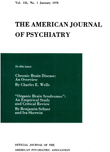THE INCIDENCE OF NOCTURNAL ENURESIS AFTER AGE FIVE
Abstract
Nocturnal enuresis persists into adult life much more commonly than generally recognized. Although normal children are supposed to gain bladder control before age 3, 16. 1 per cent of a group of 1000 consecutive selectees questioned at an army induction station reported enuresis after age 5. Two and one half per cent did not gain control until age 18 or later and isolated cases continued bed-wetting to age 33. Associated nervous or mental conditions were noted in 63 per cent of the cases reporting enuresis. A study of 369 inmates of a state school for mental defectives revealed enuresis in 83.8 per cent of a group of 54 idiots, 12.8 per cent of 164 imbeciles and only 4 per cent in 125 morons. It is suggested that nocturnal enuresis may frequently be regarded as a developmental defect which disappears spontaneously when maturation within the central nervous system is completed. Since the incidence of enuresis tends to decline with increasing creasing age it follows that almost any method of treatment will be effective if instituted at the proper time.
Access content
To read the fulltext, please use one of the options below to sign in or purchase access.- Personal login
- Institutional Login
- Sign in via OpenAthens
- Register for access
-
Please login/register if you wish to pair your device and check access availability.
Not a subscriber?
PsychiatryOnline subscription options offer access to the DSM-5 library, books, journals, CME, and patient resources. This all-in-one virtual library provides psychiatrists and mental health professionals with key resources for diagnosis, treatment, research, and professional development.
Need more help? PsychiatryOnline Customer Service may be reached by emailing [email protected] or by calling 800-368-5777 (in the U.S.) or 703-907-7322 (outside the U.S.).



